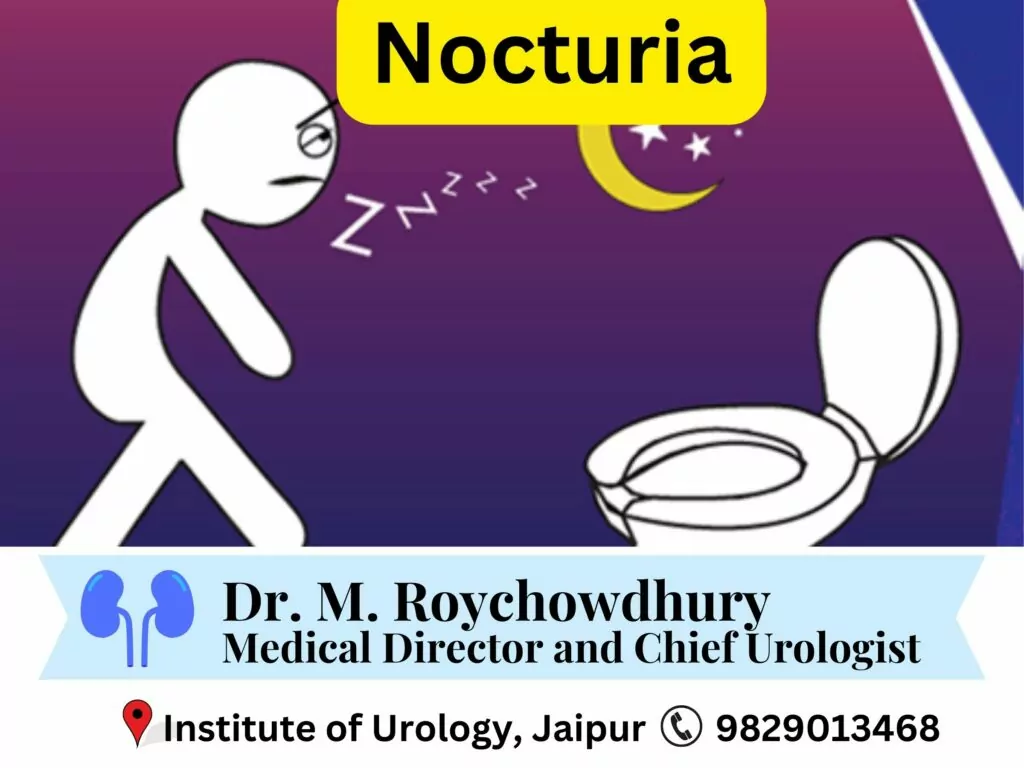Nocturia is a medical term that refers to the condition where an individual wakes up during the night to urinate. While it is considered normal to wake up once during the night to use the bathroom, frequent episodes of nocturia can disrupt sleep patterns and affect overall quality of life. Nocturia becomes more common with age, and it can be associated with various factors such as an enlarged prostate in men, hormonal changes in women, urinary tract infections, overactive bladder, or certain medications. The severity of nocturia can vary, and persistent or bothersome cases should be evaluated by a healthcare professional to determine the underlying cause and appropriate management.

According to studies, it is estimated that around 60% of people over the age of 60 experience nocturia, and the prevalence further increases with advancing age. Additionally, factors such as certain medical conditions, medications, and lifestyle factors can contribute to the occurrence of nocturia. It’s important to note that while nocturia is more common in older age groups, it can affect individuals of various ages and should be addressed if it significantly impacts sleep and overall well-being.
What are the Symptoms of Nocturia?
- Frequent Nighttime Urination: Waking up two or more times during the night to urinate is the primary symptom of nocturia.
- Increased Urinary Volume: Nocturia is often associated with passing a significant amount of urine during each nighttime episode.
- Difficulty Returning to Sleep: After waking to urinate, some individuals may find it challenging to fall back asleep, impacting overall sleep quality.
- Urgency: A sense of urgency to urinate, particularly during nighttime episodes, may be present.
- Impact on Quality of Life: Nocturia significantly affects a person’s well-being, leading to daytime sleepiness and fatigue.
What are the Causes of Nocturia?
The causes of nocturia, or waking up during the night to urinate, can be diverse and may involve various factors. Here is a detailed exploration of potential causes:
- Age-Related Changes: As people age, changes in bladder capacity and function can lead to increased nocturia, especially among the elderly.
- Nocturnal Polyuria: An excessive production of urine during the night compared to the daytime is a common cause. This can be due to various factors such as fluid imbalances, heart conditions, or hormonal fluctuations.
- Overactive Bladder (OAB): Conditions causing overactivity of the bladder muscles, like OAB, can result in increased urgency and frequency, contributing to nocturia.
- Enlarged Prostate (in Men): Benign prostatic hyperplasia (BPH), a common condition in older men, can lead to an enlarged prostate, causing nocturia by obstructing urine flow.
- Urinary Tract Infections (UTIs): Infections in the urinary tract can irritate the bladder, leading to increased frequency, urgency, and nocturia.
- Diabetes: Uncontrolled diabetes can cause increased urine production, leading to frequent urination, including during the night.
- Hormonal Changes (in Women): Hormonal fluctuations, especially during menopause, can contribute to changes in bladder function and nocturia.
- Medications: Certain medications, such as diuretics, can increase urine production, while others may affect bladder function and contribute to nocturia.
- Sleep Disorders: Conditions like sleep apnea or insomnia can disrupt sleep patterns and contribute to nighttime awakenings, including those related to urination.
- Fluid Intake Timing: Consuming large amounts of fluids close to bedtime can increase urine production and contribute to nocturia.
- Chronic Heart Failure: This condition can lead to fluid retention, resulting in increased nocturnal urine production.
How is the Diagnosis of Nocturia made?
- Medical History: The doctor will inquire about the frequency and severity of nocturia, overall urinary patterns, associated symptoms, and any relevant medical history.
- Voiding Diary: Keeping a voiding diary, which records fluid intake, times of urination, and the volume of urine passed, provides valuable information about urinary habits.
- Physical Examination: A physical examination may be conducted to assess factors such as signs of fluid retention, prostate enlargement (in men), or pelvic organ issues.
- Blood Tests: Blood tests may be performed to check for conditions such as diabetes or renal function abnormalities.
- Urinalysis: A urine sample analysis can help identify signs of urinary tract infections or other abnormalities.
- Post-Void Residual Measurement: This test measures the amount of urine left in the bladder after urination, providing insights into bladder emptying.
- Urodynamic Studies: Specialized tests, such as urodynamic studies, assess bladder function and may be conducted to identify conditions like overactive bladder.
- Imaging Studies: In some cases, imaging tests like ultrasound, CT scans, or MRI may be used to assess the structure and function of the urinary tract.
- Sleep Evaluation: If sleep disorders are suspected, a sleep evaluation may be recommended to assess overall sleep quality and identify potential contributors to nocturia.
- Hormone Levels (in Women): For women, assessing hormone levels, especially during menopause, may provide insights into hormonal influences on bladder function.
Based on the findings, the healthcare provider can determine the underlying cause of nocturia and develop an appropriate treatment plan. It’s essential for individuals experiencing persistent or bothersome symptoms to seek professional evaluation for accurate diagnosis and tailored management.
How is the Treatment of Nocturia done?
The treatment of nocturia depends on the underlying cause identified through a thorough medical evaluation. Here is a detailed exploration of treatment approaches:
- Addressing Underlying Causes:
- Medical Conditions: Treating underlying conditions such as diabetes, urinary tract infections, or hormonal imbalances is crucial.
- Overactive Bladder (OAB): Medications that target bladder muscle activity, such as anticholinergics or beta-3 agonists, may be prescribed.
- Enlarged Prostate: For men with an enlarged prostate (BPH), medications like alpha-blockers or 5-alpha reductase inhibitors or surgical interventions may be considered.
- Lifestyle Modifications:
- Fluid Management: Adjusting fluid intake, especially in the evening, can help reduce nocturia episodes.
- Dietary Changes: Avoiding caffeine and alcohol, which can contribute to increased urine production, may be beneficial.
- Behavioral Techniques:
- Bladder Training: Gradually increasing the intervals between urinations can help train the bladder and reduce nocturia.
- Double Voiding: Encouraging individuals to empty their bladder twice within a short timeframe before bedtime can aid in more complete emptying.
- Medications: Specific medications can be given as per the diagnosis by the urologist. In general,
- Desmopressin: This medication, which reduces urine production, may be prescribed in cases of nocturnal polyuria.
- Hormone Replacement Therapy (in Women): For women experiencing hormonal changes, hormone replacement therapy may be considered.
- Treatment of Sleep Disorders:
- Sleep Apnea Treatment: If sleep apnea is identified, treatment modalities such as continuous positive airway pressure (CPAP) therapy may be recommended.
It’s essential for individuals experiencing nocturia to consult with a healthcare professional for a personalized treatment plan tailored to the specific underlying causes and individual health needs. Regular follow-up and adjustments to the treatment plan may be necessary to achieve optimal results.
Do Not Ignore Nocturia!
Nocturia, the phenomenon of waking up during the night to urinate, varies in relevance across different age groups and genders. Among the elderly, age-related changes, such as decreased bladder capacity, contribute to a higher prevalence, while in younger individuals, conditions like overactive bladder or urinary tract infections may be implicated. In men, nocturia can be associated with an enlarged prostate, more common in older age, while factors like pregnancy, childbirth, or menopause may contribute in women. Although research on the seasonal impact on nocturia is limited, indirect influences such as increased fluid intake during warmer seasons or changes in urinary tract infection rates may play a role. It is crucial to note that persistent or bothersome nocturia warrants consultation with an expert urologist to identify and address potential underlying conditions.
Nocturia Treatment in Jaipur, Rajasthan – Institute of Urology, C Scheme
In the field of urology, particularly concerning conditions like nocturia, the Institute of Urology emerges as an exemplar of excellence. Recognized for its sophisticated approach and a team of proficient specialists, this institute delivers unparalleled care to individuals grappling with the challenges of nocturia. Their commitment to meticulous diagnosis, personalized treatment strategies, and a patient-centric ethos ensures the provision of the highest standard of care, precisely tailored to individual needs. The Institute of Urology’s steadfast dedication to advancing urological healthcare positions it as a trustworthy choice for those seeking distinguished expertise in managing conditions such as nocturia, thereby fostering a healthier and enhanced quality of life for each patient entrusted to its care.
We now also have the facility of online consultation with our expert urologists. This would help you discuss about your problems in detail from the comfort of your home. At our hospital, we have in house imaging and basic pathology services which makes sure the patient does not have to go place to place for investigations and reports. All services are provided within the hospital premises itself ensuring Total Urology Care Under One Roof. Our Urologists can be reached Monday to Saturday during working hours on the following numbers:
Dr. M. Roychowdhury – 9929513468
Dr. Rajan Bansal – 8601539297







